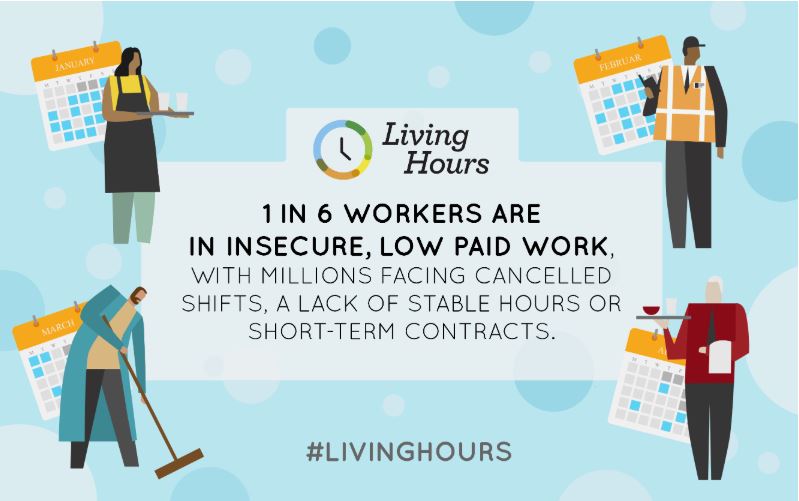- Content
- News
- Work Insecurity - Living Hours Campaign Launched
13 June 2019 | Updated 14 June 2019
The Living Wage Foundation has launched Living Hours, a new programme to tackle the widespread insecurity many 'employees' suffer over hours they might get to work - especially those unwillingly caught in the zero hours' snare.
The scheme will require organisations to pay the real Living Wage and commit to provide workers with at least four weeks’ notice of shifts, a contract that accurately reflects hours worked, and a contract with a guaranteed minimum of 16 hours a week.
Organisations that agree to these measures will be accredited as Living Hours employers alongside their Living Wage accreditation.
5 million trapped
The announcement, in the week ending June 14, comes as new research commissioned by the Living Wage Foundation has revealed that one in six - or around 5 million workers - are in low paid, insecure forms of work, including short-term contracts and contracts with unpredictable pay and hours.
The research found:
-
2 million workers in low paid, insecure work are parents.
-
Over a fifth (22%) of workers aged 16-24 are in low paid, insecure work. In most types of insecure work measured, young people are worst affected.
-
However, insecurity is not just a problem for young people – 1 in 2 employed people (46%) experiencing insecurity and low pay at work are over the age of 35.
-
Over a fifth (21%) of the working population in Wales experiences low paid, insecure work; 18% in the North-East; compared to 15% in London; and 13% in Scotland.
-
Those from black and minority ethnic backgrounds are disproportionately affected - 15% of white people in work are experiencing low pay and insecurity in comparison to 17% of workers from mixed/multiple ethnic groups, 17% of Asian/Asian British workers and 17% of Black/African/Caribbean/Black British workers.
First to commit
Major Living Wage employers including Richer Sounds, SSE and Standard Life Aberdeen have committed to sign up to the scheme.
Katherine Chapman, Director of the Living Wage Foundation, said: “The Living Wage has put almost £1 billion extra into the pockets of more than 200,000 workers, yet it’s increasingly clear that pay is not the only driver of in-work poverty. A lack of secure, stable hours is leaving millions of families struggling to keep their heads above water. This isn’t good for workers or businesses.
“Constant uncertainty over the number of hours, timings of your shifts or the amount of pay you’ll get each week places people under enormous pressure. A shift cancelled at the last minute might sound small but it can be the difference between being able to pay for your family’s dinner that night or going hungry. And being expected to work at short notice means you can’t plan around other costs and commitments."
Ambitious but achievable
Chapman continued: “We’ve consulted with hundreds of workers, employers and trade unions in drawing up these measures to ensure they are ambitious but achievable. We believe Living Hours will provide an important new measure to fight in-work poverty and to provide workers and their families with stability and security.”
Julian Richer, Founder and Managing Director of Richer Sounds, said: “If you treat the people who work for you well, you’re going to have happier, more motivated staff - ones that stay with you for years. That makes a huge difference, and that’s what I’ve found paying the Living Wage. We just need more businesses to realise this. Offering Living Hours is a great way to provide workers with security and it’s also going to help businesses in the long-run.”
So much more
John Stewart, Director of HR at SSE, said: “The Living Wage campaign has made huge strides in ending in-work poverty. But there is another side of the coin - the number of hours worked and the security of those hours. This campaign to create an employer culture of Living Hours has the potential to do so much more.”
Mental health
A former theme park worker, interviewed by the Living Wage Foundation who wishes to remain anonymous, said: “Working on a zero hours contract for three years made me feel exhausted and negatively affected my mental health. Our rota for the week was sent out on Sunday evenings and with shifts regularly changing, I couldn’t plan my week and always felt that I had to be available to work.
"I also worked as a ‘breaker’, which meant spending the whole day at work but only being paid for the couple of hours a day spent covering other colleagues’ shifts when they took a break. If the weather was bad or suddenly turned, the theme park would be closed and everyone sent home. Sometimes this meant giving up a whole day but only being paid for an hours’ work...or not at all. I’ve since moved to a new job which has a full-time contract, which means I’m able to save money and plan my week to spend time with family.”
Another interviewee, Phillip, who works at a national delivery service, said: “I worked on a zero hours contract for four years where I had no rights, didn’t get holidays and had to work back the time for any bank holidays taken. I have three small children to look after and not knowing my shift patterns until a week before made it difficult to plan time together and organise childcare. Now I’ve moved on to a permanent contract that reflects my hours I feel more valued by my employer and can plan ahead to put money aside.”
To read The Living Hours Report - Click Here
Picture: One in six - or around 5 million workers - are in low paid, insecure forms of work.
Article written by Brian Shillibeer | Published 13 June 2019
Share
Related Articles
Jobs Paying Less Than The Real Living Wage Drops To Seven-Year Low
Less than one-fifth (19%) of UK jobs now pay below the Real Living Wage (as defined by the Living Wage Foundation), with the latest estimate down from 22% last year and...
Read Full Article
RICS Quals Earn The Big Bucks & Gender Pay Gap Closing
A 39% higher salary – that's the effect a RICS qualification has on average pay in the real estate and built environment sector says our survey.
This is just...
Read Full Article
Heading Down A Different Path Towards Diversity
CEOs from 32 of the country’s leading energy and utilities employers have launched a Sector Inclusion Commitment - a long-term commitment to attract more diverse...
Read Full Article
New Living Wage Foundation Toolkit Urges Service Providers to Pay Employees Fairly
A new toolkit to help employees in the service provision industry earn a real living wage has launched.
It’s estimated that 3.7 million jobs are paid below the...
Read Full Article
Cleanology’s Dominic Ponniah Elected to Living Wage Foundation’s Leadership Group
The Co-Founder and CEO of Cleanology, Dominic Ponniah, is joining the Living Wage Foundation’s Recognised Service Provider Leadership Group as Co-Chair.
The...
Read Full Article
Real Living Wage Increases in the UK
Those working for Real Living Wage accredited employers are set to receive a pay rise: to £12 an hour across the UK (£1.10 increase), and £13.15 an hour...
Read Full Article
Real Living Wage Rate Rises to £10.90 an Hour
The Living Wage Foundation has brought forward its wage increase due to the sharp rise in living costs.
The new Living Wage rates have risen to £10.90 an...
Read Full Article
FM Firms Win at Living Wage Champion Awards
Several companies in the facilities management industry featured in the winners' list at this year’s Living Wage Champion Awards.
EMCOR UK, a provider of...
Read Full Article
Living Wage Updates in FM
Some businesses in the facilities management sector commit to paying their staff an independently calculated Living Wage – let’s take a look at the latest...
Read Full Article
How the National Living Wage Rise Could Impact Your Security Services
With many officers paid the National Living Wage, security workforces are going to be some of those most impacted by upcoming changes.
Julie Hulme from Expeditious...
Read Full Article
.gif)
.gif)
.gif)
.gif)





.png)



.png)




